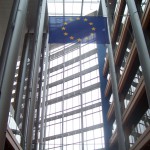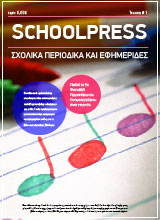DEC • 18 • 2012
From our correspondent George Adam, a pupil of B4
It is one of those stories you hear and don’t believe. You happen to hear that such incidents happen, and then wonder how much you wanted it to happen to you. Or at least that’s how I saw it. It’s simple: you are notified that during this week you will have to write an essay at school and the winner wins a trip to Strasbourg to visit the European Parliament.
Initially the idea of the trip gets into you, and you don’t really think about the hard part of it, that in this whole process you must write an essay. It’s basically when you decide on it and one day you ask about the topic you have to write. They answer “The contribution of the European Parliament to reduction of the democratic deficit in the European Union». The truth is that the difficulty of the topic should not be surprising, since in order to pass you will definitely need to work. And in any case, you had to study a lot. Although initially it seemed like «民主主義の赤字を減らす» you slowly found a way out of the vast maze of online information and in the blink on an eye… the day you start writing has arrived.
At this point I think we should gloss over the description of the painstaking examination and the even worse waiting period. Apart from the fact that it is not one of my most pleasant memories, the part in which we visited the European Parliament is clearly more interesting and as a magazine we need readers. So, fast forward to the days of the visit, noting only that the committee specified that each participating school (24 in number) would send only one representative.
Having forty eight hours to meet with the other Greek representatives, we managed to come together as a team before the important day. Originally the situation was relaxed. Although the night before anxiety was there in the back of our minds, we easily allowed ourselves to get carried away by the magic of winter in Strasbourg and that somehow made us not care about the surprises we would face the next day. The bomb went off in the early dawn and most of us, me included, woke up rehearsing improvised speeches we had prepared for the occasion. You see, we had been told that at the Parliament we would be asked to talk before the other European students (about 500) in one of the available languages , namely in English or in French. So, guided by ignorance we all recruited our foreign language experience to make presentations worthy of high requirements. 
The topics of these presentations concerned specific issues , such as » where do the values of Europe stand in the world “,”European volunteerism», » the environment and renewable energy sources «, etc. , six in total , with which students were asked in advance to deal with in depth and to be able to express an informed view discussing with other participants . Fortunately ( or unfortunately for those who had labored researching ) the whole affair with presentations and speeches in front of the public was merely a misunderstanding , since the actual meetings unfolded with other rhythms and rules than we expected.
As we neared the site of the European Parliament, the tension escalated. Eventually we reached the coveted destination and saw a dazzling spectacle. Yes, the photos were good. Yes, we had heard various things about the place that helped us to form even a rough picture. But nothing compares to the grand spectacle of the building of the European Parliament standing in front of your eyes. Speechless we walked inside taking many photos with cameras and mobile phones. Somewhere at the entrance, when we mixed with the missions of other countries, we realized that we had entered into a literally different world that would host us for the next few hours and would give us perhaps one of the most valuable experiences of our life.
After a typical bag check, we separated according to our choices of the aforementioned issues in working groups and proceeded to the dining room. Officially the Euroscola (this is how the day is called) had begun for us. Around tables arranged in 200-300 sq.m., Spaniards , Poles, Germans , Slovaks , Lithuanians , Latvians , Italians , British ( etc. ) students , as same numb as we were, got to know each other , talked , exchanged ideas . The miracle of multiculturalism. At that place and for the given time, debts, Eurobonds, loans, interstate relations came in second place.
A pleasant surprise at breakfast was the visit of the Cypriots to our table. The ice thus broke quickly and, apart from being really good kids, there were at least some people that we could talk to in Greek for the rest of the day.
After the dining room came the main conference room of the Parliament, where the assemblies of the MEPs are carried out in real time. Later we would be informed that that the essence of our visit was to replicate a real conference, pretending to be Members of the European Parliament and considering the given theme, instead of questions of European caliber. In the first phase, the officials of the Parliament came to us students and referred to what the function and objectives of the European Union and the elected bodies are. Afterward, a selected person from each mission would present their country to the audience of the Parliament, while our gathering will conclude with questions and concerns of students on the news at European level. This last step, however, proved futile. Although accurate positions were heard by the adolescents, the responses of the officials were disappointing, as they were not very clear.
Next on schedule was returning to the dining room where lunch was accompanied by the Eurogame: four-member groups are rapidly formed (whose members were forbidden to be of the same nationality) aiming to reply to a questionnaire on the history of the EU and 17 questions written in each of the 17 languages of the European family. Needless to say that in the blink of an eye the room was converted into an Arabic market: people shouting, coming and going, negotiating and discussing. In my opinion, a brilliant exercise for better interaction of students of different nations of Euroscola.
The big surprise was yet to come. The pre-chosen issues emerged in the spotlight once again, now in the form of shapes (e.g., circle, rhombus, trapezoid …) and participants in each subsection passed into an auditorium where a full debate would take place. Moderators of the debate would be two persons who, in order to be voted for, would have to present those elements of themselves that make them more suitable for the position. To my luck, I was elected moderator of the group Circle (“Democracy and Citizenship «) in which we were asked to seek ways to arouse further interest in our fellow citizens for democratic and political life of the European Union. And remember: all this should be done in English. The way the conversation developed was amazing: peers arguing and giving their opinions on the matter to an unprecedented level. Suggestions and comments, explanations and skirmishes. The potential of a generation that is eager to work and creation through a constructive dialogue.
I admit that by the end of the debates the rest of the day was somewhat indifferent. Although as a coordinator I had to present the results of the dialogue to the group and thus to speak to the House, demanding and exciting simultaneously, fatigue built up among the students and reduced their enthusiasm. The Eurogame finals were the finale of the story, with the best teams answering a number of open questions and the winners returning home with cup in hand.
It is understood that the above is a rendering of the events that unfolded over several hours and therefore there is nothing surprising or shocking to their simple narration. Having lived through this experience I want to give one message to the readers. Never and for no reason underestimate an opportunity when it appears. Life doesn’t throw opportunities in front of you. Life throws them somewhere nearby and leaves you to look and find them!


